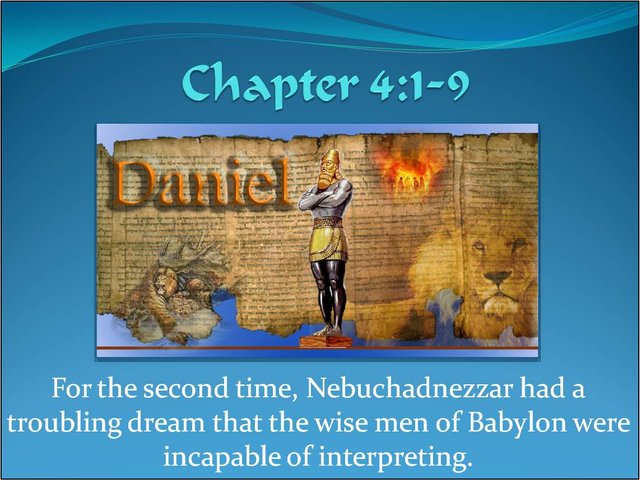For the second time, Nebuchadnezzar had a troubling dream that the wise men of Babylon were incapable of interpreting.

King Nebuchadnezzar,
To the nations and peoples of every language, who live in all the earth:
May you prosper greatly! Daniel 4:1
WRITTEN IN ARAMAIC
This entire chapter is written in Aramaic. The Aramaic language was the common language or lingua franca, used in Assyrian, Babylonian and Persian communication. It was the bridge language or trade language used to make communication possible between people who didn't share a native language or dialect.
It was expeditious that a letter addressed to all the nations and peoples of every language that composed King Nebuchadnezzar’s Empire would be written in Aramaic as opposed to having his letter translated into many languages and dialects. But the scope of his letter is meant to reach far beyond the borders of his empire to peoples and nations of all the earth.
MIGHTY WONDERS
It is my pleasure to tell you about the miraculous signs and wonders that the Most High God has performed for me.
How great are his signs, how mighty his wonders! His kingdom is an eternal kingdom; his dominion endures from generation to generation. Daniel 4:2-3
The purpose of Nebuchadnezzar’s proclamation is to tell the world of the mighty wonders that the Most High God who rules eternally had performed in the king’s behalf.
TERRIFYING IMAGES
I, Nebuchadnezzar, was at home in my palace, contented and prosperous. I had a dream that made me afraid. As I was lying in bed, the images and visions that passed through my mind terrified me. So I commanded that all the wise men of Babylon be brought before me to interpret the dream for me. When the magicians, enchanters, astrologers and diviners came, I told them the dream, but they could not interpret it for me. Daniel 4:4-7
As in the second year of his reign, Nebuchadnezzar had a troubling dream. Once again, the wise men of Babylon were incapable of interpreting the king’s dream.
DANIEL IS TOLD THE KING’S DREAM
Finally, Daniel came into my presence and I told him the dream. (He is called Belteshazzar, after the name of my god, and the spirit of the holy gods is in him.)
I said, “Belteshazzar, chief of the magicians, I know that the spirit of the holy gods is in you, and no mystery is too difficult for you. Here is my dream; interpret it for me. Daniel 4:8-9
Daniel was trained in the language and traditions of the Chaldeans. He was made the leader of the Babylonian wise men. Daniel's abilities were from Yehovah and not from Babylonian magic.
In chapter two, after Daniel had given King Nebuchadnezzar the interpretation of his dream of an enormous, dazzling statue, the king proclaimed to Daniel, “Surely your God is the God of gods and the Lord of kings and a revealer of mysteries, for you were able to reveal this mystery.” Yet, the king states that Daniel is called Belteshazzar, after the name of his god, Bel.
Marduk, in Mesopotamian religion was the chief god of the city of Babylon and the national god of Babylonia. He was eventually called simply Bel, or Lord. Originally, he seems to have been a god of thunderstorms but gradually came to be thought of as the god of order and destiny.
Clearly the king did not worship Daniel’s God. Since the Babylonians had many gods, the king attributed Daniel’s abilities to the spirit of the holy gods in him. In reality, it was the LORD God of Israel who is the revealer of dreams.
